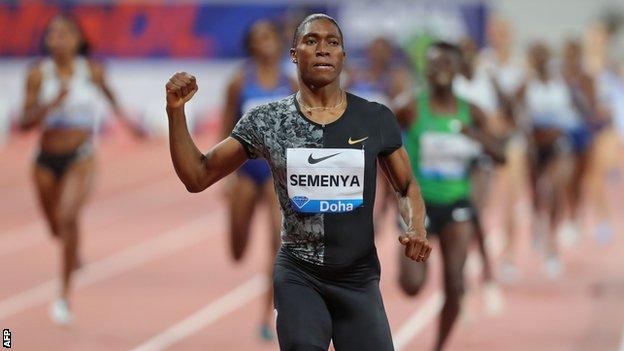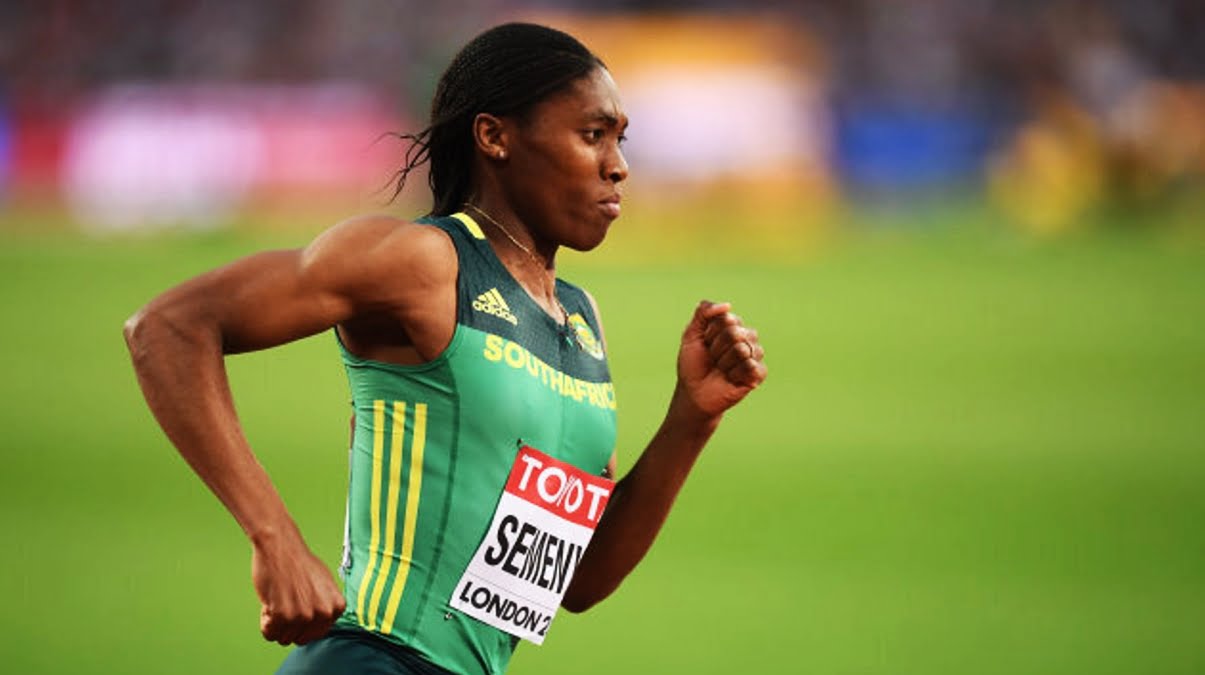“Person with normal levels of testosterone would be at a performance disadvantage.”
This is the ‘justification’ by IAAF (World Athletics) given to South African 800m Olympic champion Caster Semenya in the legal case against athletics’ governing body. The ruling by the Court of Arbitration for Sport (CAS) means that Caster Semenya, who has not been beaten over 800m since 2015, will have to take medication to significantly reduce her testosterone levels if she wants to run internationally at events between 400m and a mile. The assumption, of course, is that testosterone confers athletic ability.
As someone who has been a sportsperson and has had some direct encounters with these debates that would turn bitter almost instantly with women feeling ‘betrayed’ by anything that complicated the medicalised ascertaining of gender. After years of self-doubt, I thought of putting down some of my thoughts into words.
Why do we obsess over what confers ability and not what deprives it? Why has the body as an essential and suspended object in time become the main concern for the referees? The ‘biological body’ after-all is socially produced which does not only lead us to a discussion on self determination of gender but also, that life itself is irreducible to biology; which isn’t eternally imbued with meaning. Modern science is no holy grail. Our bodies are invested with and contested sites of class struggle, power, ideology which is but responsible for where we are located in society and in deed how we understand and experience gender; what we get to eat or don’t eat, where we train or don’t train; the burdens that allow and disallow us from pursuing athletics as a career.
I could think of many more historically naturalised problems that create performance disadvantage for ‘normal’ athletes — which begs us to ask: “Who sets the norm against whom you define the other?” Clearly the white man’s testosterone levels define the ‘objective’ standard.
This causal linking of testosterone and athleticism is erroneous. Higher testosterone levels do not translate into victory and if they give you an ‘advantage’, so do many other things in the world — like not having to fear for one’s survival in a racialised, class differentiated world while also undergoing training. Its pathetic that after having her body invaded with violent medical examinations, the violence of ‘pure sex’ determining her everyday and existence — Caster Semenya is the one made to seem at an ‘advantageous’ position!
Also read: Female Bodies In Sports And The Body Policing They Are Often Subjected To
Its pathetic that after having her body invaded with violent medical examinations, the violence of ‘pure sex’ determining her everyday and existence — Caster Semenya is the one made to seem at an ‘advantageous’ position!
The playing field is uneven to her disadvantage from the start even before she set foot on the starting line of the race and now finally, if she has trained hard enough to win accolades, she is deemed ‘un-natural.’ “I am very disappointed by this ruling, but refuse to let World Athletics drug me or stop me from being who I am,” Caseter Semenya said in the statement on September 8. Who is constructed as an anomaly to ‘normal’ women, one whose body needs to be ‘tamed’ artificially to be able to participate ‘equally’? We need to understand why this divorcing of the body from its social field is done to simplistically establish ‘(dis)advantage.’
It is particularly infuriating how sports ideology asserts on biological determination despite its emphasis on ‘training hard to get reward’ — a discourse that thrives on individual motivation and perseverance rather than objective conditions of equality that supposedly provide an equal ground for people’s talent to find expression. The ‘natural gift of talent’ argument runs alongside ‘train hard to retain your gift or make up for the lack of it,’ under capitalistic sports. It is used to essentialise bodies, reproduce sexual difference, crystallise merit onto bodies, and conceal its markedness that simply exceed such positivist determination.
Conversations simply oscillate between individual’s strength and perseverance. There is never a mention of the social field in which the athlete’s body is formed — some arrive at it through hard labour on the fields, others through training in stadiums — some give high fees, some undergo training without equipment or the necessary infrastructure. However, in the discussions about ‘competitive advantage,’ none of this finds mention except as ‘success stories’ that reproduce the logic of individual grit and determination. It appears then, there is no ‘social’ in competition — only a disembodied body, individual effort, natural gift and responsibility. The sportsperson is born out of thin air — the athlete’s body miraculously appears as such as though it is undisciplined. Yet, when an athlete from a village in Assam like Hima Das fights all adversity and becomes a champion, their success story serves an evidence for a ‘never say die’ attitude.
The individual is isolated from their socio-political field. The body is isolated from what it embodies — reduced to a set of hormones, chromosomes, muscles. This isolation is deliberate. It narrows our scope of imagination to the ‘body,’ without paying attention to how the body is being produced and managed. “Just look at her!” Caster Semenya’s body is the object of our scrutinising gaze and medical examining because it’s ‘always’ been so. It appears that drugs are more ‘natural’ than her ‘deviant’ body because…we have naturalised discrimination as a ‘necessary’ part of ‘debating gender.’
Caster Semenya’s body is the object of our scrutinising gaze and medical examining because it’s ‘always’ been so. It appears that drugs are more ‘natural’ than her ‘deviant’ body because…we have naturalised discrimination as a ‘necessary’ part of ‘debating gender.’
Sport has been reduced to a competition-driven-outcome-oriented (with the kind of money that rides) business that the pleasure of participating in a run is scooped hollow! We no longer look to enhance people’s participation—we seek to reinforce competitive strategies to reproduce social inequalities. If you find inconsistencies, in the approach towards Caster Semenya, then rest assured the inconsistency is by design.
Some of these questions are not unfamiliar to me since we would often have our seniors warn us about women who were ‘visibly different,’ use that as a pretext to disqualify their performance establish and speculate their ‘testosterone levels.’ Speculations ran amok when I used to train for free, thanks to my university affiliation, where women’s bodies were constantly under scrutiny for being ‘manly’.
With it, was the fear of losing which was too great to surpass. How many could afford to participate in a race without the pressure to win it? Some had their fellowship and marks riding on it, others had their admission guaranteed, their families’ responsibilities, their own dreams pegged on the price money. Not many could risk losing. I understand the all-pervasive fear of losing—and its unequal ramifications and layered implications — but we need to recognise the artificial creation of fear that’s bolstered by these deeply sexist non-debates around sportspersons’ bodies and try to navigate through this without consolidating our social power against those who are already on the margin just because they refuse to be relegated to the margins!

All this euphoria around ‘performance’ advantage does not rest on medical sanctions of chromosomes or hormones, but is built upon an edifice of an unequal competition which only allows a few to even enter the realm of the competition, leaving outside the many who are a product of structurally induced and produced poverty. So in the context of enjoying a sport, we have to move past the trap of retrospectively thinking of gender through the prism of competition. What we need is to think of ways of creating commons, such that it lessens the dependence on the charity-competition circuit of big corporations that have monopolised sports, such that we strip them of the power to:
1) Reify normative gender as a ‘competitive standard,’ with ideology of biology and politics of knowledge production at its core
2) Reduce sport to its commercial logic which barely ever translates into athlete’s gain but renders intense competition as the center against which ‘natural advantages’ are measured, which is both misleading and divisive.
Also read: The Horror Of Sex Verification In Sports
Stop feeling threatened by Caster Semenya or anyone else, who no longer gives you the ontological security of being ‘pure’ — by being the Other against whom we can define ourselves as a coherently sexed subject!
Until then, stop feeling threatened by Caster Semenya or anyone else, who no longer gives you the ontological security of being ‘pure’ — by being the Other against whom we can define ourselves as a coherently sexed subject! Till then, let Caster Semenya’s words ring loud, “A man can change the rules but he cannot rule my life.” Let this injustice haunt gender naturalism and purism.
Featured Image Source: Huffington Post Canada
About the author(s)
Avantika Tewari is a researcher and social activist based in Delhi.




